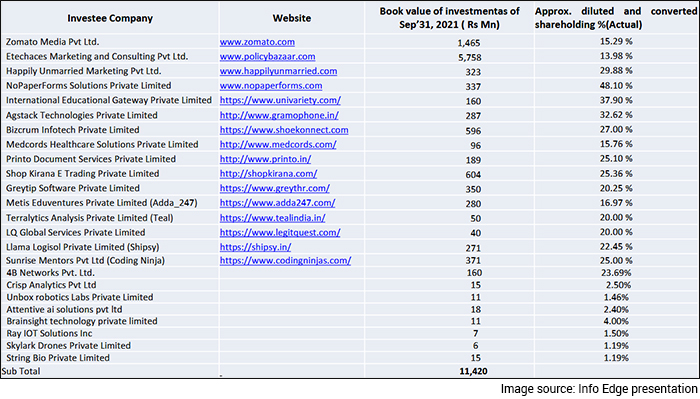India's Third Giant Leap
This Could be One of the Biggest Opportunities for Investors
Forget Startups. Here's a Bigger Investing Idea

After a stellar listing, Nykaa's recent results with over 90% dip in profits have been a tad disappointing.
The share price has corrected.
I still don't see enough margin of safety in the stock. Its valuations are staggering compared to listed companies, with its profits just a fraction of theirs.
But I'm a fan of the niche it has created for itself in just a few years, in a highly competitive market.
It has the right elements in place - a growing market, a platform or digital business model to make the most of the opportunity, economies of scale, and a well-known brand. Last but not the least, it's on the path to profits.
With the right execution, it's possible, in the future, the valuations will be justified.
This is not a recommendation to buy the stock.
But it's a reflection on what makes seemingly similar businesses different. And how certain players override competition and create value in niches where no one expected.
It all begins from the vision of the promoter or the management. Their ability to think 'different'. Their conviction to walk a path that no one has taken before. Lastly, a solid systematic approach to take the business to heights the competition could never visualise.
Now this is getting a bit theoretical. Allow me to explain with an example I shared with my subscribers a few weeks ago.
I came across this in a book I recently read and loved - Blue Ocean Strategy by W Chan Kim and Renee Mauborgne. The book does a good job in explaining what makes businesses 'different'. I highly recommend you read it.
It classifies strategies in two classes - Red Ocean and Blue Ocean.
Red ocean is a highly competitive space. You could compare it to an ocean saturated with sharks, where everyone is attacking each other and turning the waters red.
Blue Ocean, on the other hand, is an unexplored marketplace. Less cluttered, with lots of space, runway, and resources to grow.
| Red Ocean | Blue Ocean |
|---|---|
| Comepete in existing market space | Create uncontested marketspace |
| Beat the competition | Make the competition irrelevant |
| Exploit existing demand | Create and capture new demand |
| Make the value cost trade off | Break the value cost trade off |
| Align the whole system of firm's activities with its strategic choice of differentiation or low cost | Align the whole system of firm's activities in pursuit of differentiation and low cost |
Coming back to the example...
The company in question belongs to aviation industry - highly competitive, capital intensive, vulnerable to macro-economic shocks, and notorious for being a losing proposition for investors.
It's about how Southwest Airlines, charted a separate route to differentiate itself.
The competition was busy wooing customer on the similar strategies - lounge facilities, meals, seating choices. The company took the bold step of dropping the frills and stepping away from the peer game.
It instead focused on frequent point to point departures for mid-sized cities. The industry was then operating on hub and spoke model. The latter is costlier and time consuming.
Consider not just the time cost in switching flights, but also the costs on food, stay, car transport in case of a gap between connecting flights.
This unique approach of Southwest Airlines offered a proposition for customers that was missing. It came with shorter flight times, friendly service, and cheaper flying.
The decision to not copy the competition allowed the company to save a lot of money. This money was used to offer to offer attractive prices and more flights on shorter routes.
This was a win -win strategy, for the business, and customers. It resulted in lower costs, fast and convenient travel.
For Southwest Airlines, the strategy created a new class of customers. It was not long before intercity car passengers converted to fliers.
And indeed, that was reflected in its tagline:
'The speed of a plane at the price of a car, whenever you need it'.
The message reached the masses. And sales took off.
The is just one example of what makes a certain company in an industry extraordinary, and why late comers often upend the market and decimate first movers. For instance Apple versus Napster.
Such examples are present across industries. The key differentiating factor is managements that do not opt for a 'me too' approach.
They instead offer a unique value innovation to create new markets. In the process, they add value for both the business and the users. In realising this vision, these businesses renders competition irrelevant.
Do the recent startups, which have made it to the bourses, qualify under this category?
I don't think so.
While they have indeed incorporated innovation (technology) and value to users, they are yet to create any value for themselves in the process. They are also dealing with huge competition.
For Zomato, there is Swiggy. For Paytm, there is competition from Google Pay, Phone Pe, Razor Pay and others.
This is a critical point to ponder.
The real differentiators create sustainable value and virtuous feedback loop. However, most startups, despite claiming to be disruptors, are growing on borrowed money, creating unsustainable and non-self-reliant business models.
The startups that do qualify on this aspect do not need public money anyway. For instance, Zerodha founder, Nitin Kamath, is not keen on going public as he does not need external money for business to function well.
On the contrary, for Zomato, with just six months of cash and 90% drop in the business due to covid first wave, going public was not a choice but a desperate contingency plan.
The hype around the new age businesses - startups and loss making companies that have listed recently, may make one believe these are the only disruptors, differentiators or companies exploring blue seas.
But this is far from the truth.
Within the listed space, there are multiple companies that have been playing the game differently, and profitably.
Consider Info Edge.
Mainly known for Naukri.com, company enjoys nearly 70% market share in the online job listing segment and makes profits on this vertical.
It also has portals like 99 acres that deals in real estate, enjoys 35% market share, and competes with magic brick.
It also has a stake in Jeevansathi, the online matchmaking portal which is otherwise not listed.
And then there is a portal called Shiksha for online educational reference and counselling.
It's been in news for being one of the early stakeholders in Zomato. It's estimated to have made over 1,000 times returns on its investment in Zomato.
But its quest to explore is far from over.
The unique thing about Info Edge has it's been funding and incubating many other startups.
Here is a list of ventures in which it has invested.
Investment Portfolio

Many of these are futuristic businesses. Even if one of these goes the 'Zomato Way', it could be a huge windfall for the company.
Another example is BSE Ltd.
Until a year ago, the stock was trading at undemanding valuations. At a price to earnings ratio of 14 times, the market was ignoring the duopoly it enjoys in listing related business.
Valuations then were completely indifferent to its market leadership in blue ocean businesses like Star MF (mutual fund platform) for distributors and advisors, SME, BSE Bond platform, international exchange, and new launches like insurance broking, power exchange, commodity derivatives, etc.
If we look closer, there are many companies breaking away from competition, and exploring new blue oceans.
They are not in the limelight like unicorns, or startups. But could offer sustainable growth, along with margin of safety in valuations.
Stay tuned for more updates on such stocks...
Warm regards,
Richa Agarwal
Editor and Research Analyst, Hidden Treasure
Recent Articles
- A Unique Smallcap Stock for Your AI Watchlist November 22, 2024
- AI is the future, whether or not you are ready for it. To avoid missing out, here is a stock for your watchlist.
- Why the Stock of Sanghvi Movers Should be on Your 2025 Watchlist November 21, 2024
- This smallcap stock is a good proxy play for the wind energy megatrend.
- Is Innovation Already Priced into Siemens India's PE Ratio of 100? November 20, 2024
- Siemens India's 100x PE an indicator of economic buoyancy or market froth?
- 20 Stocks to Watch in 2025 November 19, 2024
- Your guide for putting together a watchlist of stocks for 2025.


Equitymaster requests your view! Post a comment on "Forget Startups. Here's a Bigger Investing Idea". Click here!
Comments are moderated by Equitymaster, in accordance with the Terms of Use, and may not appear
on this article until they have been reviewed and deemed appropriate for posting.
In the meantime, you may want to share this article with your friends!